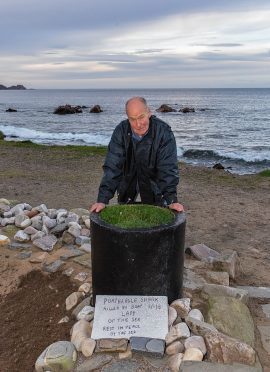A deadly predator which became a fascination after mysteriously washing up on a Moray beach has been given a final resting place in a beloved local pet cemetery.
The deceased porbeagle shark, a member of the man-eating Great White family, was the talk of Cullen town when it drifted ashore 11 days ago.
Wildlife experts at the time believed it was likely the 7.5ft female shark died in deeper waters, to which they are native, before being dragged in by the tide.
However, an autopsy performed by a marine biologist at Macduff Marine Aquarium proved inconclusive.
After the stomach had been removed, the body was left on the beach to be washed back out to sea.
But, an unsung village hero who keeps the heart beating in the village’s animal graveyard had other ideas.
Stephen Findlay, 77, has been tending to plots at Cullen’s pet cemetery for nearly 25 years, creating a lasting tribute for hundreds of family companions.
He decided that the porbeagle — which he has named “Lady of the Sea” – had such an impact on the locals that she deserved a respectful burial in the site’s largest grave to date.
She now rests alongside scores of household pets, and less conventional residents such as seals, dolphins and even a chicken.
Mr Findlay said: “I’m pretty sure, with the almighty gash that was down her side, she was killed by a boat propeller.
“I would have liked to see her swimming about, but I got some friends to help me get her down here and her head is by the sea now.
“At least she has a bonnie view.”
The inscription on the headstone created by Mr Findlay reads: “Rest in peace by the sea.”
The retired bin man added: “Usually, you’d say RIP — rest in peace — for these kinds of things.
“But, she is facing the sea, and that’s her home, so I thought it should be RIP by the sea.”
The pet cemetery began after local doctor Susan Morrison asked Mr Findlay to bury her pet spaniel, Ben, in 1992.
The burial ground is based along a stretch of seafront east of the village’s harbour, and is sheltered by an overlooking brae.
